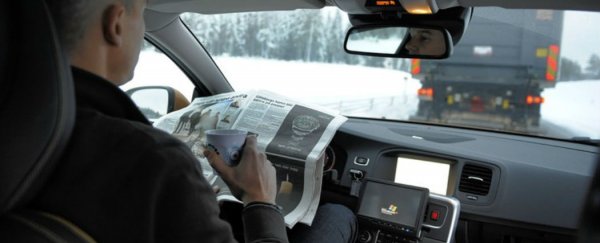While driverless cars of all kinds of makes and models have been easing their way onto streets across America since March, down here in the southern hemisphere, we've been feeling a bit left out. But we won't be for much longer, because come November, South Australia will host the first on-road driverless car trials in the southern hemisphere, with automated Volvos set to cruise the streets of suburban Adelaide.
The driverless Volvo tests will be take place on the Southern Expressway on November 7 and 8, and will coincide with an international conference on driverless cars, also held in Adelaide. The trials will be overseen by scientists at local research institutions, Flinders University and Carnegie Mellon University, plus industry experts at the Royal Automobile Association of South Australia, Cohda Wireless, and Bosch. Bosch and Telstra will also be testing out their own technology in an effort to establish a local driverless car industry to meet future needs.
"The advent of driverless cars is an opportunity to foster technological innovation and revive Australia's manufacturing industry - the South Australian Government has been quick to recognise this," Gerard Waldron, managing director of the Australian Road Research Board (ARRB), told ABC News.
"ARRB will establish how driverless technology needs to be manufactured and introduced for uniquely Australian driving behaviour, our climate and road conditions, including what this means for Australia's national road infrastructure, markings, surfaces, and roadside signage," he said.
According to the ABC, Volvo will be shipping out driverless cars from Sweden that have been involved in their Driver Me campaign, which aims to put driverless cars on the market by 2017. Their cars will be put through their paces as they perform tricky moves such as overtaking, changing lanes, hitting the breaks in an emergency, and sliding up and down ramps.
The local government also seems to be enthusiastic about the prospect of Australian-made driverless cars, promising to pass laws allowing them on public roads in the next 10 years, presumably so as not to get left out of what's predicted to be a $90 billion global industry.
"Driverless cars have the ability to revolutionise transport in this country and we want to be at the forefront of that paradigm shift," State Premier Jay Weatherill told the press. "It is our ambition to be a test bed for innovation across a whole range of areas such as this."
This is exciting news, because Australia really does need to curb its love of cars for the sake of the environment. There are now more than 17.6 million motor vehicles registered in Australia to service a population of 23.13 million, and as of 2012, only 16 percent of Australians used public transport to get around, with just 4 percent walking and 2 percent cycling habitually.
With driverless cars on the road, there might be more of an incentive for young people to ditch the huge cost of owning their own car in favour of ride-sharing instead. And research suggests we'll all be a whole lot more safe on the roads too. "We know that about 90 percent of all crashes are caused by driver error, and driverless cars have the potential to see far fewer deaths and injuries on our roads in the future," Transport Minister Stephen Mullighan said.
